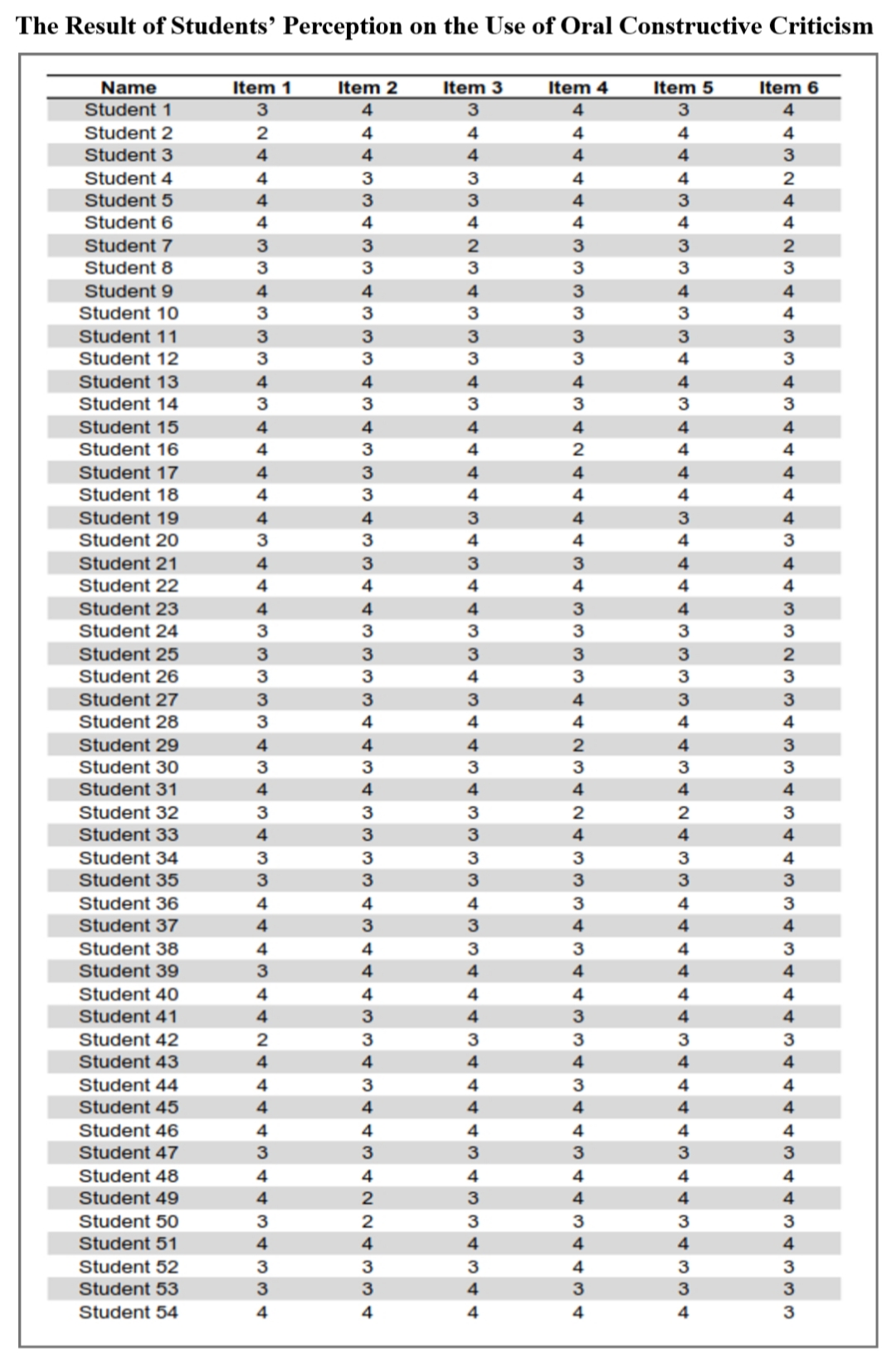The power of constructive criticism and its effect on students' learning motivation
DOI:
https://doi.org/10.21070/jees.v6i2.1408Keywords:
constructive criticism, language learning motivationAbstract
The present study sought to understand EFL students’ perception on the use of oral constructive criticism given by faculty members in the classroom and whether it has any effect on the students’ motivation in learning English. The participants of the study were 86 EFL students from 5 outstanding universities in Malang, East Java, Indonesia. The data were collected through a questionnaire and an interview. The results of the study revealed that the 86 EFL students had positive perceptions on the use of oral constructive criticism. The students were helped in some ways in learning English by means of receiving oral constructive criticism from their faculty members. The students considered oral constructive criticism a confirmation whether they did the right things in the learning process. More prominently, the result showed that the use of oral constructive criticism played a big role in boosting the students’ motivation in learning English. The students did not feel constructive criticism as a thread that inhibited them from being their best version of themselves in learning English. Instead, the students were strongly motivated to study hard and get good scores because of oral constructive criticism that they received during the teaching and learning process.
HIGHLIGHTS :
- Constructive criticism is considered a necessary tool to help students recognize their mistake, learn from it, and stop repeating the same mistake in the near future.
- Faculty members should continuously provide constructive criticism for students to boost their motivation in learning English.
- Students feel highly motivated to study hard and achieve high grades because of the verbal constructive criticism they receive during the teaching and learning process.
Downloads
References
Creswell, J. W. 2012. Educational Research: Planning, Conducting, and Evaluating Qualitative and Quantitative Research, 4th Edition. Boston: Pearson Education Inc.
Dornyei, Z. 2019. Towards a Better Understanding of the L2 Learning Experience, the Cinderella of the L2 Motivational System. Studies in Second Language Learning and Teaching, 9(1), 19-30. DOI: 10.14746/ssllt.2019.9.1.2.
Dornyei, Z. & Ushioda, E. 2009. Motivation, Language Identity and the L2 Self. Bristol: Channel View Publication.
Fong, C.J., Warner, J.R., Williams, K.M., Schallert, D.L., Chen, L., Williamson, Z.H., & Lin, S. 2016. Deconstructing Constructive Criticism: The Nature of Academic Emotions Associated with Constructive, Positive, and Negative Feedback. Learning and Individual Differences, 49, 393-399. DOI: 10.1016/j.lindif.2016.05.019.
Fong, C.J., Schallert, D.L., Williams, K.M., Williamson, Z.H., Warner, J.R., Lin, S., & Kim, Y.W. 2018. When Feedback Signals Failure but Offers Hope for Improvement: A Process Model of Constructive Criticism. Thinking Skills and Creativity. DOI: 10.1016/j.tsc.2018.02.014.
Harmer, J. 2001. Practice English Language Teaching, 3rd Edition. United Kingdom: Pearson Education Limited.
Hyland, F. & Hyland, K. 2001. Sugaring the Pill: Praise and Criticism in Written Feedback. Journal of Second Language Writing, 10, 185–212.
Kamins, M.L. & Dweck, C.S. 1999. Person versus Process Praise and Criticism: Implications for Contingent Self-Worth and Coping. Developmental Psychology, 35(3), 835-847.
Latief, M.A. 2019. Research Methods on Language Learning an Introduction, 7th Edition. Malang: Universitas Negeri Malang.
Lecce, S., Caputi, M., & Hughes, C. 2011. Does Sensitivity to Criticism Mediate the Relationship between Theory of Mind and Academic Achievement? Journal of Experimental Psychology, 110 (2011), 318-326. DOI: 10.1016/j.jecp.2011.04.011.
Leung, K., Su, S., & Morris, M.W. 2001. When is Criticism not Constructive? The Role of Fairness Perceptions and Dispositional Attributions in Employee Acceptance of Critical Supervisory Feedback. Human Relations, 54(9), 1155-1187.
Mizokawa, A., & Lecce, S. 2016. Sensitivity to Criticism and Theory of Mind: A Cross Cultural Study on Japanese and Italian Children. European Journal of Developmental Psychology, DOI: 10.1080/17405629.2016.1180970.
Mokhtar, Z. M., Amran, M. S., & Roslee, M. J. (2021). With Emotions, We Learn: Understanding Emotions in Learning English as A Second Language (ESL). International Journal of Academic Research in Progressive Education and Development, 10(3), 361–372. DOI: 10.6007/IJARPED/v10-i3/9932.
Nguyen, T.T.M. 2013. Instructional Effects on the Acquisition of Modifiers in Constructive Criticism by EFL Learners. Language Awareness, 22(1), 76-94, DOI: 10.1080/09658416.2012.658810.
Nguyen, T.T.M. & Basturkmen, H. 2010. Teaching Constructive Critical Feedback. TESOL Journal.
Petress, K. 2000. Constructive Criticism: A Tool for Improvement. From https://www.questia.com/library/journal/1G1-66760571/constructive-criticism-a-tool-for-improvement.
Rahimi, A., & Bigdeli, R. A. 2014. The Broaden-and-Build Theory of Positive Emotions in Second Language Learning. Procedia – Social and Behavioral Sciences, 159, 795-801, DOI: doi: 10.1016/j.sbspro.2014.12.451.
Shao, K., Pekrun, R., & Nicholson, L.J. 2019. Emotions in Classroom Language Learning: What Can We Learn from Achievement Emotion Research?. System, 86, 1-11, DOI: 10.1016/j.system.2019.102121.
Stockinger, K., Rinas, R., & Daumiller, M. (2021). Student Adaptability, Emotions, and Achievement: Navigating New Academic Terrains in A Global Crisis. Learning and Individual Differences, 90, 1-10, DOI: 10.1016/j.lindif.2021.102046.
Suryanto. & Sari, Z.E. 2020. Difficulties and Strategies in Learning English: An Analysis of Students from English and Non English Department in Indonesia. Advances in Social Science, Education, and Human Research, 518, 313-331.

Published
How to Cite
Issue
Section
License
Copyright (c) 2021 Anggi Putri Suri Wulandari, Mirjam Anugerahwati

This work is licensed under a Creative Commons Attribution 4.0 International License.







